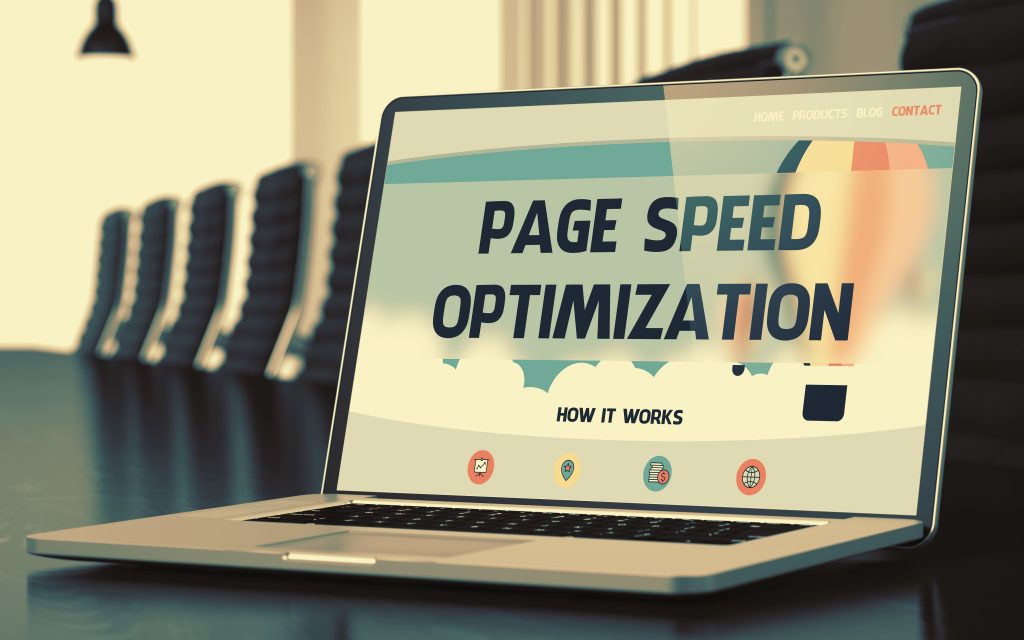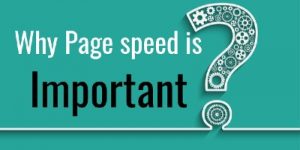Importance Website Speed Optimization in SEO

Fast is better than slow. Yea, that’s a popular saying in our modern world. That’s because everyone loves seeing faster results. Since the internet is fast becoming an important mechanism for everyone, search engine companies are constantly rising to the needs of their users.
And What’s That Need?
It’s Simply a Fast-Loading Web Page.
 Indeed, website speed optimization is important in this age and century. Fortunately, It’s now one of the factors search engine bots evaluates for page ranking. When a website loads faster, internet users tend to become more engage with it and even recommend it to other friends and colleagues.
Indeed, website speed optimization is important in this age and century. Fortunately, It’s now one of the factors search engine bots evaluates for page ranking. When a website loads faster, internet users tend to become more engage with it and even recommend it to other friends and colleagues.
In a recent Google update, any page that loads beyond 2 seconds is slow. That shows that speed is much important to search engine companies also. From all indications, Google isn’t stopping at its current updates. More ranking metrics are coming up soon.
But before those future releases, it’s essential to admonish ourselves about the value of website speed optimization, especially in the year 2020.
Wait a moment! How fast is your website loading? 1 second, 2 seconds ,3 seconds or even a minute?
Oh! If it’s beyond 2 seconds, that’s not good enough. Web visitors often get worked up and infuriated with a slow loading site. The moment they realize their waiting time on a page is exceeding 2 seconds, they abandon the site for another one.
Such Circumstance Thus Causes a High Churn Rate.
 Minimizing churn rate on your site is one of the good importance of page speed. Other importance includes:
Minimizing churn rate on your site is one of the good importance of page speed. Other importance includes:
⇒ Faster page load speed is important for better ranking by search engines.
⇒ Having a fast load page is the first impression you can ever make about your website. Psychologically, fast websites are considered reliable, trustworthy, consistent and professional. Speed is related to confidence, trust, and reliability.
⇒ It’s an avenue to help users/visitors to access the page they want faster and easily. No one likes time wasters. Not giving your visitors what they want at the particular time they need frustrates and angers them.
⇒ It helps to reduce bounce rate in the sense that many websites have lost many visitors on their websites due to slow load page. Nearly half of a website user can leave due to incessant slow speed. While having a fast load page helps to reduce his kind of situation. Fast load page will instead make people stick with your website.
⇒ Increases visitors satisfaction and experience. Giving visitors what they are looking for and give them fast is the strategy. And this is why page load speed must be your number priority for better user experience and satisfaction.
⇒ Website speed optimization will help to increase your SEO.
According to research, about 95% webpages in several countries have improved in their speed. Even webpages that have never worked on improving their site saw to it that their webpage was improved due to Google stance on page speed. Also, developers are ensuring that page speed is one of their greatest feature ever since 2018.

So, You Must Not be Left Out in The Website Speed Optimization Process.
To optimize your website page speed, you must ensure every page on your site load within two seconds, which is the ideal speed time.
A page loading speed rating ranges from excellent, acceptable to poor. If it’s excellent or acceptable, then the loading speed is under a second or two seconds — however, a poorly rated page speed excess two and a half seconds.
What are the ways to determine your website speed optimization?
1. By Testing Your Page Load Speed on Mobile Device
Most website operators only make use of computers and laptops to access their site. However, it’s always a good move to have a mobile version of your website. This is not because of anything order than the fact that most Web users make use of smartphone devices to access the internet. This was gathered from a study into mobile device usage.

This is the recent trend on the www directory. And it’s expected that the number of people visiting e-commerce pages will increase because of the rise in mobile phones usage. Nonetheless, one must know that mobile versions of websites will load slowly compared to original versions.
What this means is that you can’t use the code you are using for the Web version of your site on the mobile version. You will need to adjust that code to work compatibly with the mobile version so pages can load within two seconds or less.
The idea is that when you are testing page load speed, test it on the web and the mobile version of your site.
2. By Checking Page Load Speed
There is nothing difficult in checking page load speed. It is now made simple ever since Google has provided some online tools that can allow you to do this.
Google Labs developed this tool and it can be used as a web-based tool. You can also combine it with your site as an addition. Page Load Speed will let you know if your pages are loading below expectations and will also suggest solutions on how to increase the page load performance.
One of the Best online tools by Google, to check Page Speed Online- click here to check –
How Can Page Load Speed get better?

Below are some of the ways your page load speed can get better.
⇒ CSS and scripts should be saved as external files: One of the things that can make your page load slowly maybe because each time visitors click on a page on your site, your style sheets also load up. When you save your CSS and scripts as external files, style sheets will no longer load all the time, and every file will only load just once for your site to work as expected and perfectly. And every page on your website will open faster as visitors click on them.
⇒ Fix Redirects: Having too many Redirects is an avenue to create more HTTP requests and higher load time. If there are any broken links, fix them up as fast as possible.
⇒ Unimportant Plugins: Every plugin you add to your website utilizes your resources, and this causes slow page load speed and performance. Some plugins are important, while some are not. Make a selection of those plugins that will be of benefit to your website and avoid the rest.
⇒ Optimize Images: Images takes the largest share in your web page size. And as such, both images and graphics help to get the attention of your audience. Images must be downloaded first to the users’ device before they can be displayed, and this alone can take time. It’s advisable always to optimize images. And this is one major thing that can be done to improve page load.
⇒ Keep your images small: You must make your images as small as possible. When creating new images or making use of existing ones, these few tips can help: Lower the color depth, edit an image to remove additional extras such as comments, crop images to perfect size, and resize images to reduce the size.
⇒ Load background images through external CSS: with external CSS, you can load non-background images as part of the background. This tip will make your image to keep loading late while the text page will load faster.
⇒ Lower Domain Name System (DNS) lookups: DNS lookups often take time to send IP address back to a hostname. When it is like that, there’s nothing that the browser can do unless these lookups are complete.
Also, a webpage that is blessed with resources, nic features, and elements makes use DNS lookups, and in turn, it reduces the page load speed. Cut the hostname numbers and increase your website speed.
⇒ Content Delivery Network: CDN is a geographically distributed network of proxy serves and all their data centers. Standard servers take time to grant resources requests which causes page load time to slow down. Ensure to use CDN for content delivery where necessary.
⇒ Reduce unimportant wasted whitespace: Whitespace can increase your page load time and increase the page size. Same with line returns and comment tags. Examine all of these and make corrections where needed.
⇒ Make use of Browser Caching: This allows your website visitors to save copies of your website’s different pages. Mainly for them to be able to access the pages later on when they need to so they won’t have to start reloading the pages again but will pull up from their cache. This makes loading faster and quicker. This also helps to lower your website hosting cost.
Checking Websites for Issues on SEO
SEO website performance can be checked using many criteria. SEO website has just two distinct parts which are;
⇒ On-Site SEO
⇒ Off-Site SEO
-
On-Site SEO
Certain metrics must be regarded when measuring on-site SEO on websites which may include the following;
HTML Header
⇒ Title Tag
⇒ Meta Description Tags, and so on.
Body Content
⇒ Keyword
Consistency
⇒ Amount of content
⇒ Heading tag, and so on.
Web Crawler Metrics
⇒ Image Alt Attributes
⇒ On Page Link Structure
⇒ Broken Links
⇒ Robots.txt, etc.
Usability
⇒ Device Rendering
⇒ Use of Mobile Viewpoint, etc.
Performance Result
⇒ Page speed info
⇒ Page Size Info
⇒ Number of Resources
⇒ GZIP Compression, and so on.
Security
⇒ SSL Enabled
⇒ Malware Check, and so on.
-
Off-Site SEO
These are actions and steps taken outside your website to improve your rankings within the search engine result. It comprises of actions taken to impact search engine and user thought of a website. It is based on Expertise, Authoritativeness, and Trustworthiness.
Offsite SEO can be measured in two ways:
⇒ Creating interesting content that people would have an interest in and would willingly be connected to.
⇒ Getting involved and partnering with other notable sources on the internet to influence your website and, thus, improving your website connection.
In conclusion, a slow loading page can make users abandon your website and lose interest in your website. Ensuring that your website pages load quickly to expectation will do your business good and will help to retain your website users. If you are not so sure how your speed server works, check your speed checker now and have a comparison between your site and other many sites. here
TAKE AWAY:
Page speed is a crucial element every website owner shouldn’t discard while setting up their site. To achieve a faster loading speed, you to optimize every component of your website. Likewise, you must spend quality time in testing the site before deployment. Never be in a hurry to deploy a website that is not tested. It’s due diligence you should under-rate. Remember, only a website with good loading speed acquires visitors faster and better.
